
Bernard Fall in Vietnam, 1960s: photographer unknown, n.d. (courtesy of Dorothy Fall, via National Archives and Records Administration; reproduced in Robert Fahs: Bernard B. Fall and the Limits of Armed Intervention, from Prologue, Spring 2011, Vol. 43, No. 1)
Bernard Fall, a committed scholar/historian, son of Viennese Jewish parents murdered by Nazis, raised in France, a veteran of the French Resistance, had stood alongside French soldiers in their doomed attempt to retain a colonial foothold in Indochina in the 1950s. Fall's account of their ultimate debacle at Dien Bien Phu would be published as Hell in a Very Small Place, 1954. Seven years later another evocatively titled work, Street Without Joy (its title a translation of the name given by the French to a particularly lethal and unforgiving stretch of Vietnamese coastal terrain), would suggest that French command and strategy had been flawed, and that anti-colonial insurgency in Vietnam could not be quelled by conventional methods. Fall proposed the use of counterinsurgency tactics inspired by the guerilla-warfare methods of the adversary, and argued for economic and political intervention on a large scale. And he contended that in order to expel Communism from Vietnam, the full weight of American military might would be required.
Fall completed his academic dissertation on the Viet Minh regime in 1955 and began a career in teaching and governmental contracting and consultancy. He taught international relations at Howard University and worked as an instructor at the National Security Agency. Increasingly however, in articles and talks -- particularly in an April 1958 speech in New York and in an essay the following month in The Nation -- his idiosyncratic views on the inadequacy of traditional methods of counterinsurgent warfare, and his stated skepticism concerning the new Diem regime in South Vietnam, brought him under scrutiny in Washington.
Fall's ideas had become known, and were, perhaps somewhat ironically in light of later events, interpreted by officials as critical of U.S. policy. His career work for the U.S. government as a contract analyst was thus hampered, with the trouble coming to a head after he was invited to apply for a position with the International Cooperation Agency (later USAID) at the Royal School of Administration in the new independent Cambodia. The ICA wanted to put Fall to work as adviser to the U.S. embassy in Cambodia and as a professor of international relations at the Royal School in Phnom Penh. A phantom U.S. State Department hand, however, entered the hiring process at a decisive point in the negotiations. Graphic evidence of the cloak-and-dagger form of this intervention can be found in documents reproduced by the scholar Robert Fahs in an article in the National Archives and Records Administration journal Prologue (Spring 2011, Vol. 43, No. 1).
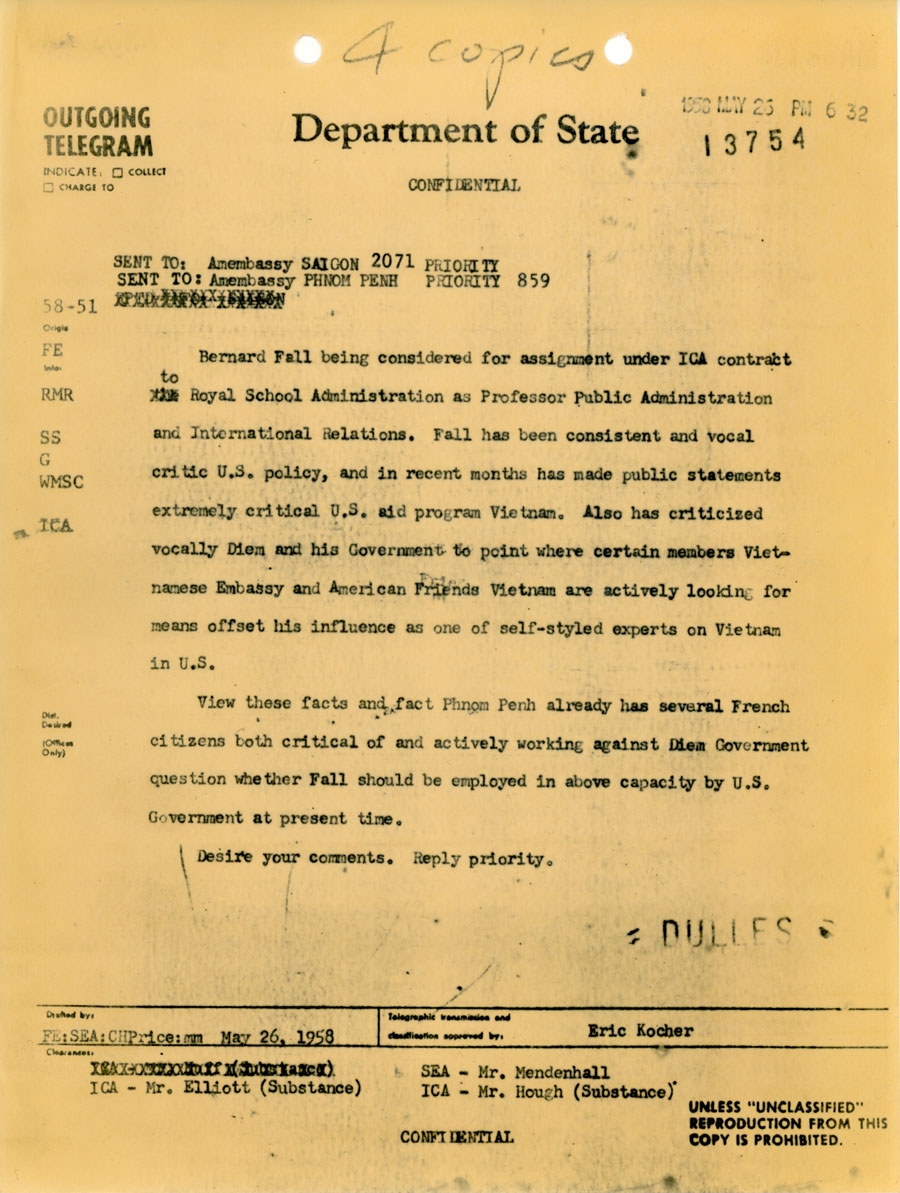
Secretary of State John Foster Dulles opposes Fall's appointment to the position at the Royal School of Administration in his 26 May 1958, telegram to the American embassies in Saigon and Phnom Penh: from Records of U.S. Foreign Assistance Agencies, 1942–1961/National Archives and Records Administration: reproduced in Robert Fahs: Bernard B. Fall and the Limits of Armed Intervention, from Prologue, Spring 2011, Vol. 43, No. 1
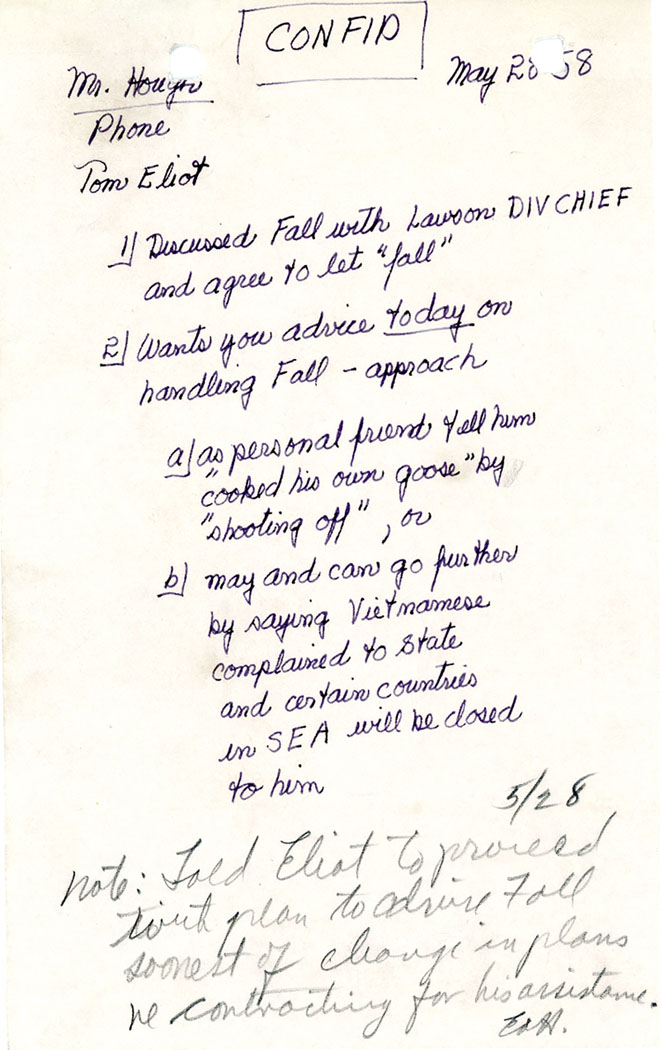
Ed Hough of the State Department notes in a May 28, 1958, memo that he had informed Tom Eliot that Hough agreed with his division chief to let Fall "fall": from Records of U.S. Foreign Assistance Agencies, 1942–1961 National Archives and Records Administration: reproduced in Robert Fahs: Bernard B. Fall and the Limits of Armed Intervention:, from Prologue, Spring 2011, Vol. 43, No. 1
Having been surreptitiously "let 'fall'", the stubbornly resilient Bernard Fall nonetheless refused to become discouraged. Despite the undermining and ultimate breakdown of contract negotiations with the ICA, he continued undeterred with his research work on Southeast Asia, and did indeed go on to teach in Cambodia, at the Royal School, but without U.S government backing, in 1961-1963.
Still he kept on studying, working, observing in the field. Though suffering from serious illness, he was back in Vietnam in 1965-1966. "He was fearless," his widow, Dorothy Winer Fall, wrote in her preface to Bernard B. Fall: Last Reflections on a War (1967); "he had to prove to himself that he was the old Bernard -- hoofing it with the troops -- in the mud and jungles of Viet-Nam. But also, he had to test his convictions and could rely only on information gathered firsthand. This was the trip on which he was to change many of his opinions." The critical shift in view for Fall was a loss of the belief that this was a war the outcome of which could ever be determined by the interference of outside agencies.
By the end of 1966 he was reporting from South Vietnam for the New Republic, and moving independently in combat areas as a war reporter.
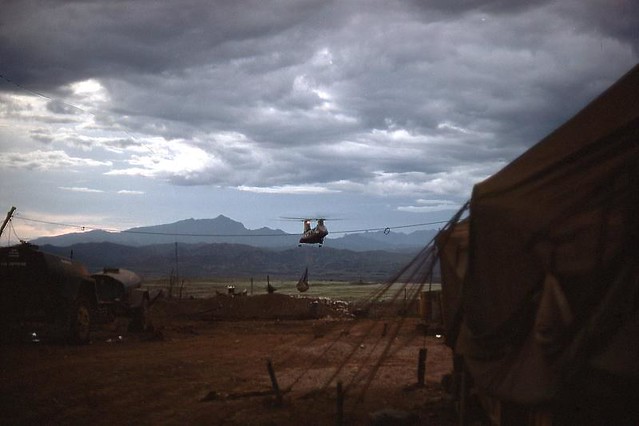
LZ. A small firebase south of Quang Tri: photo by dvdhdgkns, November [?]1969, posted 2009
Summoned during January 1967 by the U.S. First Division to assist in the prison-camp interrogation of Professor Vinh Long and Middle Level Teacher Tran Van Tan, the highest-ranking Liberation Front cadres yet to be taken into American hands, Fall learned more about the asceticism, courtesy, intelligence, dignity and unswerving dedication of the Americans' opponents.
Professor Long spoke no French, but he had come down from Hanoi, and spoke Russian, so Fall first conversed with him in Russian, and then in "my bad Vietnamese," with the aid of an interpreter.
Fall's account of their conversation appeared in a New Republic piece titled "Unrepentant, Unyielding: An Interview with Viet Cong Prisoners".
"'We were given an accurate picture of what was going on in the South and told that victory would be easy. Of course, with the Americans here, it's not so easy.' He picked up a cigarette in the C-ration carton, offered the others around, and then looked straight at me.
"'But we'll win anyway. Every country in the world helps us. Look at the American, Morrison, who committed suicide because he disagreed with American policies.'
"True, I said, but how about the other 200 million Americans who don't kill themselves?
"'The Liberation Front forces will win in any case, because all the Vietnamese people help us. The war can only be settled among the Vietnamese themselves. The Americans and their allies will go... Oh, I know the French were weaker than the U.S. is, but we'll still win because our cause is right. Did the Americans think they can stay with this kind of war for 30, 40 years? Because this is what it is going to take.'"
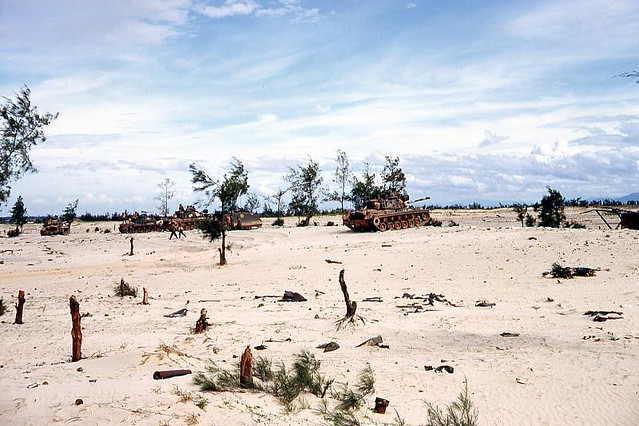
2nd Platoon. Wunder Beach, east of Quang Tri. Near Street Without Joy: photo by dvdhdgkns, October [?]1969, posted 2009
On 19 February 1967, Fall decided to accompany the U. S. 1st Battalion, 9th Marine Infantry Regiment on Operation Chinook.
For Fall this meant a return to The Street Without Joy, the area south of Danang where the French had fought in 1953. Fall probably knew the area as well as any non-Vietnamese in the country at that time, military personnel included. He had been over the same terrain with the French in Operation Camargue. Of what had been encountered then he had written in Street Without Joy as follows:
"From the coast looking inland, the zone of operations divided itself into seven distinct natural strips of land. The first was the coastline itself, fairly straight, covered with hard sand and offering no particular difficulties. However, a bare 100 meters beyond began the dunes, varying in height from 15 to 60 feet, very hard to climb and ending on the land side in veritable ditches or precipices. A few fishing villages are precariously perched in the dune zone, which in certain places has a depth of more than two kilometers. Then comes a zone of about 800 meters deep entirely covered with small pagodas or tombs and temples, which offer excellent protection to any defenders. This zone is followed by the 'Street Without Joy' itself, fringed by a rather curious system of interlocking villages separated one from the other by often less than 200 to 300 yards. Each village forms a veritable little labyrinth that measures barely more than 200 feet by 300 feet and is surrounded by bushes, hedges or bamboo trees, and small fences which made ground as well as aerial surveillance almost impossible. [The Viet Minh] had spent more than two years fortifying the villages with an interlocking system of trenches and tunnels, underground arms depots, and first-aid stations... Close to 20 miles long and more than 300 yards wide, this zone of villages constituted the heart of the Communist resistance zone along the central Annam coast."
His 1967 revisitation would later be described by his wife, who at the time was in Hong Kong awaiting him, as "a rendezvous with destiny".
It proved a fateful decision, culminating in a wrong step, the sudden abrupt bursting of a land mine, and death for Bernard B. Fall (then forty, the father of three children) and a young Marine sergeant at his side.
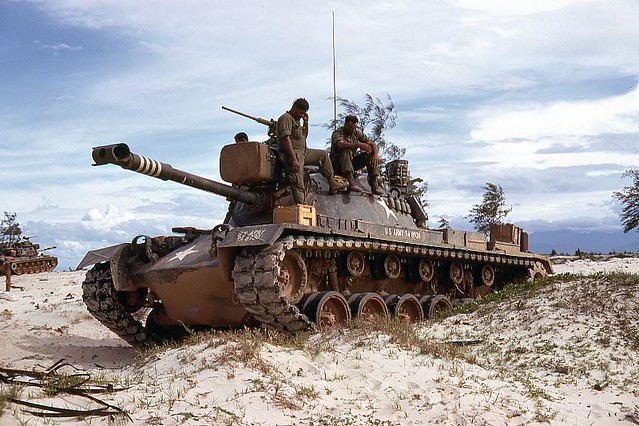
2nd Platoon, Wunder Beach, east of Quang Tri. Near Street Without Joy: photo by dvdhdgkns, 1969, posted 2009
Afternoon of the third day. Still on The Street. Now bunker system out there they're going to blow up. The weather is finally cleared and we have an observation plane over our heads, turning around shepherding us. But Charlie Company has fallen very badly behind now there's a big hole in our left flank and there's some people running away from us obviously getting out of the way . . . Trying to move across . . . we've got to start firing if they move . . .
[Sound of gunfire and plane here on tape . . . A lot of gunfire here . . . much excitement . . . Shouting of instructions, etc. . . .]
FALL. There's our machine gun firing! They're running!
VOICE: Advance word -- they're moving off to the left.
"Moving off to the left . . . running."
FALL: There's our mortar!
VOICE: What are they shooting at?
FALL: What do you mean -- they're shooting at the buffalo boys! -- Oh, for Christ's sake! Those Vietnamese . . . Oh, my God!
[A lot of rapid gunfire here]
FALL: There they go.
FALL: They're shooting at some buffaloes apparently.
[Gunfire]
FALL: How does he know?
VOICE: See that guy right in the center? You can hardly see -- move across -- got on a white jacket -- see that hat? Set up about 1100 meters -- open up with a burst of 20 . . .
FALL: It's impossible at 1100 meters to distinguish with . . .
[Gunfire]
VOICE: Very good.
FALL: There's no return fire whatever but the Chieu Hois who are with us -- there are former Viet Cong returned to the government side and are fighting now with government forces -- well, they assure us that Charlie Company is moving right through the area and by tonight we will know whether what we killed were genuine VC with weapons or simply people. I personally looked through binoculars of the platoon leader from the machine gun platoon and I saw people fleeing to the boats and waving the Vietnamese government flag with three red stripes on a yellow background. Find out more about this later . . . This is Bernard Fall on The Street Without Joy.
[Silence here on tape]
. . . . first in the afternoon about 4:30 -- shadows are lengthening and we've reached one of our phase lines after the fire fight and it smells bad -- meaning it's a little bit suspicious . . . Could be an amb . . .
[End of tape]

Secretary of Defense Robert McNamara standing at a podium in front of a map of Vietnam during a press conference: photo by Marion J. Trikosko, 29 June 1966 (U. S. News & World Report Magazine Photograph Collection, Library of Congress)

Wounded servicemen arriving from Vietnam at Andrews Air Force Base: photo by Warren K. Leffler, 8 March 1968 (U. S. News & World Report Magazine Photograph Collection, Library of Congress)



8 comments:
Astonishing in every respect. I'd forgotten about Bernard Fall. It's always remarkable to see how "big" events are composed of millions of small details, including sneaky hands and devilish, frightened, jealous and petty minds. I had lunch the other day ("downtownish") with a friend who is so practical and competent in his work and so dreamy in his thoughts. He described to me his beliefs about the new millenium and how all the signs are present that things are coming together in positive utopian ways. Clearly, he's seeing different street signs than I am. Curtis
Ah, yes, ‘Nam. A place and a time and a nightmare—of our own devising. We turned a corner back there, discovered limits, lunged ahead anyway, learned nothing, except to carry a bigger stick. The rich and powerful were consolidating the empire they’d carved out during prior episodes of serial warfare. The industrial killing machine set new records. We learned the mathematics of body counts. We did carpet bombing using ‘bomblets’; we did high-altitude terrorism. The dead fueled the economy. Lies were as thick as maggots on a mule carcass. It was a long moment of national angst. Then we found a tunnel, at the end of which a light was said to exist. Designated portions of the world were made to suffer and bleed toward this light, while being hammered with liberty and democracy and free markets. At night we partied. Nobody wins a war. One side just loses first.
Tom,
Amazing, what a story -- never had heard of Bernard Fall (good for Curtis, and you too!) -- thanks for such gripping ("astonishing") stuff. From Heller's fiction to Fall's Last Tape ---- ("Could be an amb") . . .
2.11
light coming into fog against invisible
ridge, gibbous moon in fog above branch
in foreground, sound of wave in channel
the color which belonged to
it, torn right corner
the word “forms” experience,
inside, which stilled
grey rain cloud against invisible ridge,
whiteness of gull flapping toward point
"One side just loses first." I expect that sums things up pretty well, though I feel pretty hopeless at the moment, at least in this country under this president, this administration, that anything is likely to change. (I didn't really expect anything different.) I can't get exercised blaming past presidents or generals. These are ever-advancing problems and here we are now "same as it ever was." (Since that's the first and last time I'll ever quote a David Byrne lyric, I hope I've done so correctly.)
Steve's poem complements this post really, really well. "torn right corner"; "inside, which stilled"
I love the poem and don't know how he does it.
I remember knowing about, but not understanding the significance of Bernard Fall's story, and my memories all come -- waking and sleeping -- in NY Times' typeface and black & white period photographs.
Reading this material is, I think, a wonderful, but unusual way to spend Saturday night. It was a great day. We're having one of our typical (for this winter) snowstorms -- pretty, reasonably heavy, but nothing (thank heavens) really sticking or accumulating.
Earlier today we decided to drive to a place we'd heard about but never visited - a sort of honest English pub translated to Pennsylvania horsey countryside called The Whip in Coatesville. It really was great. I'm not the world's biggest Andrew Wyeth fan, but one remarkable thing about Chester County is that the colors are exactly Andrew Wyeth's palette. Since he's a painter American kids tend to be introduced to at an early age (I'm thinking of Christina's World) and because that for me intertwines with the Bernard Fall story and Vietnam, it comes together as a mood, without obviously making any sense. Curtis
Bernard Fall's sixth and last trip to Vietnam began in December 1966. He was on a sabbatical year, was being financed by a Guggenheim grant and his wife had just given birth to their third child. For eighteen months he had been suffering from an incurable disease, retroperitoneal fibrosis, had been through several surgeries, lost one kidney, and felt, as his wife would later put it, that "his 'machine' was failing him".
So an air of fatality hung over the trip; "there were those among us who felt we wold never see him again," Dorothy Fall said.
Vietnam had long been Fall's "beloved country".
His first trip there came in 1953, researching his doctoral dissertation on the Viet Minh, the guerilla force commanded by Ho Chi Minh which was then engaged against French colonial troops. That trip he paid for with savings from his student days. He accompanied the French military on operations in the North. From a base in Hanoi he made his way deep into the provinces, visited villages, interviewed tax collectors, and gained his first inklings about the infrastructure of the Viet Minh. He learned their hold on the people and the countryside was far more extensive than the French had suspected.
On his second trip in 1957 it became apparent to him that the Diem regime in the South was far more corrupt, and far more seriously challenged by Viet Cong infiltration, than had been known.
It was as a result of his revelation of these findings, upon his return to Washington, that he fell under U.S. government surveillance.
He had retained a French passport to enable him to travel in zones where Americans were non grata. In 1962 he obtained a visa to voyage to the North, where he interviewed Ho Chi Minh and Pham Van Dong. After that trip, having by this time developed academic and professional connections in Washington, he became an American citizen.
From thence until the end of his life, he led the complicated existence of a man with many countries, caught between several worlds, entirely at ease in none of them.
He was accustomed to fraught circumstances. He had lost both parents to a war (his father captured and tortured by the Gestapo, his mother deported to Auschwitz), had fought Nazis in the French resistance as a teenager, become a university professor, worked as a private contractor for Uncle Sam, waded through jungles and swamps with different armies and come close to death so many times that it must in those closing moments have greeted him as not entirely a stranger.
Like it was only a moment ago;
McNamara, Hough, Westmorland, et al ....
the names have changed but they're yet driving-the-tanks & dropping The Napalm !
only difference now and "they" learned this from the news-reportage from, what the Vietnamese call The American War,
to censor the war-fare news... and NO REAL PHOTOS/ or
"on-site" reporting except what is Approved .
I'm a-tellin you, my memories now right back in the 1962-67 or so !
Further?
we've been in the Horse-Shit
so long
we can no longer smell the Stink !
Tom,
Thanks for further thoughts/notes on Bernard Fall (what a great name he got at birth, heading into the life he went on to live in all its turns and travels) and thanks Curtis for your note/thoughts on the poem.
Thank you for this.
Post a Comment